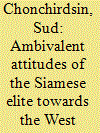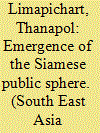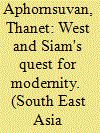|
|
|
Sort Order |
|
|
|
Items / Page
|
|
|
|
|
|
|
| Srl | Item |
| 1 |
ID:
091966


|
|
|
|
|
| Publication |
2009.
|
| Summary/Abstract |
Increasing and intensified political and cultural contact with the West during the colonial era constituted a serious concern for the Siamese elite. On the one hand, the kingdom needed to be modernized with Western-style knowledge and technology in order to survive. On the other hand, adopting Western civilization would lead to the loss of Siamese identity, which the elite wished to retain. They needed to select carefully which knowledge and culture from the West they considered to be 'civilized' and not harmful to their identity and political stability.
|
|
|
|
|
|
|
|
|
|
|
|
|
|
|
|
| 2 |
ID:
091964


|
|
|
|
|
| Publication |
2009.
|
| Summary/Abstract |
The Siamese public sphere emerged in the second half of the nineteenth century from a series of historical events - the advent of print technology, the signing of new trade treaties and the agreements on extraterritoriality between Siam and several colonial powers, beginning with the British in 1855. This critical development generated a drastic transformation in Siam's mode of textual production, dissemination and consumption. Newspapers, journals and printed books were produced for the first time, and with them came new kinds of knowledge, forms of entertainment and spaces for discursive contestation. These changes inevitably challenged the Siamese ruling elite's ability to control political discourse and literary production, along with their essential cultural authority. Since these new spaces and practices could not be prohibited or closed down by traditional means of law and order such as the exercise of raw power, the Siamese elite responded to the challenges by resorting to various strategies: proclamations, financial subsidies to and buyouts of critical newspapers, the enactment of press laws and participating in the public sphere themselves. Members of the elite thus came to play the role of publishers as well as of political and literary critics. In this respect they became, however influential, only one discursive force among others in the new space.
|
|
|
|
|
|
|
|
|
|
|
|
|
|
|
|
| 3 |
ID:
091968


|
|
|
|
|
| Publication |
2009.
|
| Summary/Abstract |
Just as Spaghetti Westerns gained popularity in Thailand in the 1960s, so too did certain types of Italian cuisine, most notably macaroni and pizza. In present-day Bangkok, Italian food has come to dominate the lifestyle of the middle and upper-middle classes, albeit frequently adapted to Thai tastes: hence 'eastern spaghetti' and pizza tom yam kung, with tomato ketchup on the side. It is commonplace for national cuisines to be adapted on importation into another country. Besides, Thai diners do not appear to be particularly concerned with authenticity - so much so that one Italian restaurant in the Silom area, a business district of Bangkok, even placed a big banner in front of the building advertising 'inauthentic' or 'hybrid Italian food' under the slogan: 'Italian Food with Thai Flavour'. Moreover, the most revered foreign cuisine in Thai culinary history was not Italian but French (and to some extent English), dating from the two visits made by King Chulalongkorn to Europe in 1897 and 1907. Nor does the current 'Italmania' for food in Thailand come as a result of close diplomatic ties with Italy, but rather as a consequence of the popularity of Italian food in the UK and the USA, dating especially from the era of the Vietnam War. However, no matter how much Thais might love Italian cuisine, they prefer not to eat it on a daily basis, and many feel it to be too rich and greasy [lian], especially when living abroad with less access to familiar Thai dishes. Just as Chulalongkorn brought his own food supplies with him to Europe, so too do outbound Thai tour guides carry chilli paste and fish sauce. Former Thai Prime Minister Khukrit Pramoj summed up the experience of travelling abroad by noting that as a Thai he wanted rice, not bread. Of all the aspects of human behaviour, food habits are among the most difficult to change; nevertheless, change they do. Thais, especially the elite, do not have a 'monotheistic cuisine'. If one can pay respect to Brahminism, animism, Buddhism, monarchism and Christianity, then one can also eat a variety of foreign foods.
|
|
|
|
|
|
|
|
|
|
|
|
|
|
|
|
| 4 |
ID:
091967


|
|
|
|
|
| Publication |
2009.
|
| Summary/Abstract |
Luang Wilat Pariwat's Khwam mai phayabat [The Non-Vendetta] published in 1915 under the pseudonym 'Khru Liam' has been acknowledged as the first full-length novel written by a Thai author in the Thai language. However, literary scholars have been ambivalent about its place in the Thai literary canon because it appears to have been written as a parody of Marie Corelli's Vendetta (1886), which was translated into the Thai language in 1901 with the title Khwam phayabat. Apparently, Khru Liam's Khwam mai phayabat was not a market success because it disappeared from the public eye until 1997 when a copy was found and reprinted in 2001. This article contends that Khwam mai phayabat is more than a parody or an imitation of a Western novel, that it is authentically Thai and is significant on several registers. First, the novel is part of a larger survival strategy to prevent Siam's colonization. Second, it warns against the negative influences of modernity and urbanization, especially on Thai women. Third, the novel celebrates Buddhist values, especially the teaching that forgiveness is the only way to stop the cycle of revenge. Khwam mai phayabat was written before its time. It criticized a Bangkok society that was rapidly modernizing with imported material goods and values from the West. Apparently, this was not attractive to the Thai readership, which preferred instead to read about adventures in Europe and in Africa. Khwam mai phayabat was followed by another novel, Nang Neramid [Divine Nymphs] by the same author, which was about the adventures of some Englishmen in Africa. Nang Neramid appeared in 1916, allowing the author to make up for his earlier financial losses.
|
|
|
|
|
|
|
|
|
|
|
|
|
|
|
|
| 5 |
ID:
091965


|
|
|
|
|
| Publication |
2009.
|
| Summary/Abstract |
This paper examines the interactions that occurred between Westerners and the Siamese elite in the nineteenth century. The author contends that the perceived superiority of Western science and knowledge came not as a result of its being Western as such, but rather as a consequence of the Siamese elite's secure political position in terms of its physical and intellectual powers. The adoption of Western knowledge was measured against the truth of Theravada Buddhism and Buddhist political ideas. Western knowledge and science thus provided the ruling classes with a modern perception of themselves and the world. Nevertheless, the persistence of Siamese sakdina [feudal] social relations ultimately prevented complete modernization. Modernity therefore ended up in the hands of the elite and did not extend to the wider populace.
|
|
|
|
|
|
|
|
|
|
|
|
|
|
|
|
|
|
|
|
|